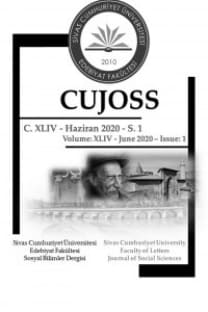Kadınlık Dolayımıyla Erkeklik Öznelliği
Bu makalede eril öznelliğin oluşumu dolayımıyla erkeklik ve kadınlık arasındaki bağlantılar ve ilişkiler incelenmiştir. Çalışma, erkekliğin toplumsal olarak inşa edildiği ve iktidar ilişkileriyle iç içe geçtiği argümanına dayanmaktadır. Erkeklik, tüm yaşam boyu süren bir süreç ve deneyim olan bir öznellik olarak ele alınmıştır. Erkeklerin inşa edilen öznellikleri çoklu ve çelişkilidir, başta eş ve “öteki kadın” olarak kadınlarla ilişkisellik içerisinde deneyimlenirler. Erkeklerin öznelliklerinin icrası onların rızasını gerektirir, fakat bazen bu karşılıklı uzlaşmaya varılamaz ve çatışma doğar. Bu, erkekler arasında öznelliklerinin farklı algılanmasına neden olur. Bu olgu Ankara-Yatıkevler Gecekondu Mahallesi bağlamında tartışılmıştır.
Subjectivity of Masculinity Through Feminity
The aim of this work is to explore the interconnections and relations between masculinity and feminity through the formation of masculine subjectivity. It is based upon the argument that masculinity is socially constructed in and intertwined with relations of power. Men’s constructed subjectivities are multiple and contradictory and they are experienced in relations with others mostly with women as wives and “other women”. Performing these masculine subjectivities necessitate their consent, but sometimes mutual agreement cannot be reached and conflict arises. This causes different perceptions of subjectivities among men. In this work this phenomenon is discussed in the context of Yatıkevler Gecekondu District.
___
- BUTLER, Judith. (1990), Gender Trouble – Feminism and The Subversion of Identitiy, New York: Routledge.
- BUTLER, Judith. (1993), Bodies Thet Matter – On The Dircursive Limits of Sex, New York: Routledge.
- FOUCAULT, Michel. (2005), Özne ve İktidar, (Çev: Işık Ergüden ve Osman Akınhay), İstanbul: Ayrıntı Yayınları.
- HARVEY, Penelope. (1994), “Domestic Violence in The Peruvian Andes”, Sex and Violence – Issues in Representation and Experience, (ed. P. Harvey ve P. Gow), London: Routledge, p.66-89.
- JACKSON, Michael. (1996), “Introduction – Phenomenology, Radical Empiricisim and Anthropological Critique”, Things As They Are – New Directions in Phenomenological Anthropology, (ed. M. Jackson), Bloomington: Indiana University Press, p.1-50.
- LANCASTER, Roger N. (1994), Life is Hard – Machismo, Danger and The Intimacy of Power in Nicaragua, Berkeley: University of California Press.
- MANSFIELD, Nick. (2006), Öznellik – Freud’dan Haraway’e Kendilik Kuramları, (Çev: H. Çetinkaya ve R. Durmaz), İzmir: Ara-lık Yayınları.
- MOORE, Henrietta L. (1993), “The Differences Within and The Differences Between”, Gendered Anthropology, (ed. T. Del Valle), London: Routledge, p.193-204.
- MOORE, Henrietta L. (1994), A Passion for Difference, Indianapolis: Indiana University Press.
- MOORE, Henrietta L. (1999), “Whatever Happened to Women and Men? – Gender and Other Crises in Anthropology”, Anthropolical Theory Today, (ed. H. L. Moore), Cambridge: Polity Press.
- TOREN, Christina. (1994), “Transforming Love – Representing Fijian Hierarchy”, Sex and Violence – Issues in Representation and Experience, (ed. P. Harvey ve P. Gow), London: Routledge, p.18-39.
- WADE, Peter. (1994), “Man The Hunter – Gender and Violence in Music and Drinking Contexts in Colombia.”, Sex and Violence – Issues in Representation and Experience, (ed. P. Harvey ve P. Gow), London: Routledge, p.115-137.
- WHITEHEAD, Stephen M. (2002), Men and Masculinities, Cambridge: Polity Press.
- ISSN: 1305-5143
- Yayın Aralığı: Yılda 2 Sayı
- Yayıncı: Sivas Cumhuriyet Üniversitesi Edebiyat Fakültesi
Sayıdaki Diğer Makaleler
1867 Konya Çarşısı Yangını ve Etkileri Üzerine Bir İnceleme Denemesi
ÖSS İçin Hazırlanmış Kitaplarda Türkçe Sorularındaki Yanlışlıklardan ‘Ancak’ Örneği
Multiple Approaches in Public Policy Analysis: A Critique of Positivist Approach
Süleyman ÇELİK, Sıtkı ÇORBACIOĞLU
21. Yüzyılın Liderlik Anlayışına Bakış
Strain, Social Bonding Theories and Delinquency
Kadınlık Dolayımıyla Erkeklik Öznelliği
Küresel Değişimler Bağlamında Dünya Enerji Kaynakları, Sorunlar ve Türkiye
Gotik Romanda Aydınlanma Karşıtlığı
